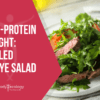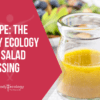Prenatal Stress Is Putting Babies at Serious Risk
When you are pregnant, you are not only “eating for two.” When you are pregnant, you are also feeling for two.
And according to research, these feelings—especially your level of stress—matter.
One study published in the Journal of Pediatric Gastroenterology & Nutrition found that stress during pregnancy could influence the type of bacteria that colonize the gut of a newborn baby. (1)
In the study, researchers observed infant monkeys. While the baby monkeys were in utero, a group of mothers were left undisturbed. Another group was startled with sound early or late into their pregnancy. Researchers found major changes in the inner ecosystems of the babies that were born to mothers exposed to stress.
Overall, stress reduced the amount of good bacteria in the gut—namely bifidobacteria and lactobacillus.
With these observations in mind, researchers concluded that even moderate stress during pregnancy could shift the balance of good bacteria and bad bacteria in the gut. Worse, the changes could also make newborns more susceptible to infection—as well as diseases that involve poorly regulated immune function.
Your Hormones and Immune System

Even moderate amounts of stress during pregnancy can affect the balance of bacteria in the gut. This can make a newborn prone to infection and disease caused by a weakened immune system.
The effects of stress are not only immediate. (2) For example, stress can and does lead to complications like:
- Miscarriage
- High blood pressure, or preeclampsia
- Premature birth
- Low birth weight
When a mother experiences recurring stress during pregnancy, studies have found that she puts her baby at risk for disease later in life, such as asthma and food allergies, type 2 diabetes, heart disease, and obesity. (3)(4)
This is called fetal programming. Research tells us that stress influences fetal programming.
This is because stress modulates chemicals and signals in the body, such as:
- Growth factors
- Cytokines, which are often involved in inflammatory signaling
- Hormones, which often affect metabolism
Other studies show that a stressful environment can permanently program your baby’s physiology to develop a disease later in life. (5)
Some stress is so severe that it creates a lasting trauma. When a pregnant mother experiences this kind of stress—especially in her third trimester—her baby’s biochemistry will also shift. For example, babies that were born to mothers who experienced the attack on the World Trade Center in 2001 were found to have low levels of cortisol—like their mothers. (6)
Low levels of cortisol are associated with post-traumatic stress disorder (PTSD), as well as disorders that involve chronic pain and chronic fatigue. (7) And the most dramatic effects of low cortisol are seen in those who are traumatized early in life—even in utero.
Stress and Leaky Gut
Stress and the chemical signals that follow a stressful event contribute to leaky gut and gut inflammation.
A 2002 study published in Gastroenterology shows that chronic psychological stress is enough to inflame the gut. (8) Because of this, you will often see psychological stress show up in the digestive system—such as heartburn, constipation, and diarrhea. (9)
Leaky gut and stress can also appear in the form of food allergies, asthma, and the broad range of symptoms that are associated with autoimmune disease. (10)(11) Stress changes the inner ecosystem of the gut—feeding bad bacteria, gut infection, and bacterial overgrowth. (12)(13)
The good news is that probiotics can help to seal a leaky and inflamed gut. (14) The best form of probiotics: fermented beverages and cultured vegetables.
A 2012 article in Psychoneuroendocrinology shows that probiotics can even help manage the stress response. (15) In other words, a healthy inner ecosystem teeming with good bacteria makes you less vulnerable to the effects of stress.
What To Remember Most About This Article:
Your stress levels during pregnancy affect both you and your unborn baby. Stress can reduce the amount of beneficial bacteria in the gut to change the inner ecosystem of a newborn. Even moderate amounts of stress during pregnancy can cause an imbalance between good and bad bacteria in the gut.
Stress during pregnancy can leave a baby vulnerable to disease throughout their life, including:
- Asthma
- Food allergies
- Type 2 diabetes
- Heart disease
- Obesity
Stress sends out chemical signals that will cause a leaky gut and gut inflammation. Stress will further disrupt the delicate inner ecosystem of the gut to feed bad bacteria, gut infection, and bacterial overgrowth.
Clearly, it’s important to alleviate stress during pregnancy. You can also protect your baby from the harmful effects of stress by enjoying fermented beverages and cultured vegetables daily to seal a leaky gut and manage the stress response.
- [product id=”169″]
- [product id=”1″]
REFERENCES:
- Bailey, M. T., Lubach, G. R., & Coe, C. L. (2004). Prenatal stress alters bacterial colonization of the gut in infant monkeys. Journal of pediatric gastroenterology and nutrition, 38(4), 414-421.
- Knackstedt, M. K., Hamelmann, E., & Arck, P. C. (2005). Mothers in stress: consequences for the offspring. American Journal of Reproductive Immunology, 54(2), 63-69.
- Wright, R. J., Fisher, K., Chiu, Y. H. M., Wright, R. O., Fein, R., Cohen, S., & Coull, B. A. (2013). Disrupted prenatal maternal cortisol, maternal obesity, and childhood wheeze: insights into prenatal programming. American journal of respiratory and critical care medicine, 187(11), 1186-1193.
- Vo, T., & Hardy, D. B. (2012). Molecular mechanisms underlying the fetal programming of adult disease. Journal of cell communication and signaling, 6(3), 139-153.
- Seckl, J. R., & Holmes, M. C. (2007). Mechanisms of disease: glucocorticoids, their placental metabolism and fetal’programming’of adult pathophysiology. Nature clinical practice Endocrinology & metabolism, 3(6), 479-488.
- Yehuda, R., Engel, S. M., Brand, S. R., Seckl, J., Marcus, S. M., & Berkowitz, G. S. (2005). Transgenerational effects of posttraumatic stress disorder in babies of mothers exposed to the World Trade Center attacks during pregnancy. Journal of Clinical Endocrinology & Metabolism, 90(7), 4115-4118.
- Yehuda, R., & Seckl, J. (2011). Minireview: stress-related psychiatric disorders with low cortisol levels: a metabolic hypothesis. Endocrinology, 152(12), 4496-4503.
- Söderholm, J. D., Yang, P. C., Ceponis, P., Vohra, A., Riddell, R., Sherman, P. M., & Perdue, M. H. (2002). Chronic stress induces mast cell–dependent bacterial adherence and initiates mucosal inflammation in rat intestine. Gastroenterology, 123(4), 1099-1108.
- Konturek, P. C., Brzozowski, T., & Konturek, S. J. (2011). Stress and the gut: pathophysiology, clinical consequences, diagnostic approach and treatment options. J Physiol Pharmacol, 62(6), 591-599.
- Yang, P. C., Jury, J., Söderholm, J. D., Sherman, P. M., McKay, D. M., & Perdue, M. H. (2006). Chronic psychological stress in rats induces intestinal sensitization to luminal antigens. The American journal of pathology, 168(1), 104-114.
- Wright, R. J., Cohen, R. T., & Cohen, S. (2005). The impact of stress on the development and expression of atopy. Current opinion in allergy and clinical immunology, 5(1), 23-29.
- Rhee, S. H., Pothoulakis, C., & Mayer, E. A. (2009). Principles and clinical implications of the brain–gut–enteric microbiota axis. Nature Reviews Gastroenterology and Hepatology, 6(5), 306-314.
- Lyte, M., Vulchanova, L., & Brown, D. R. (2011). Stress at the intestinal surface: catecholamines and mucosa–bacteria interactions. Cell and Tissue Research, 343(1), 23-32.
- Zareie, M., Johnson-Henry, K., Jury, J., Yang, P. C., Ngan, B. Y., McKay, D. M., … & Sherman, P. M. (2006). Probiotics prevent bacterial translocation and improve intestinal barrier function in rats following chronic psychological stress. Gut, 55(11), 1553-1560.
- Ait-Belgnaoui, A., Durand, H., Cartier, C., Chaumaz, G., Eutamene, H., Ferrier, L., … & Theodorou, V. (2012). Prevention of gut leakiness by a probiotic treatment leads to attenuated HPA response to an acute psychological stress in rats. Psychoneuroendocrinology, 37(11), 1885-1895.








